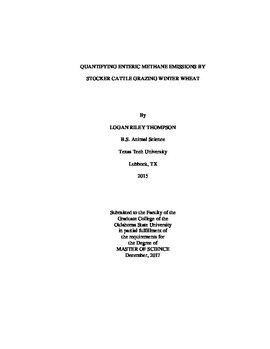| dc.contributor.advisor | Reuter, Ryan | |
| dc.contributor.author | Thompson, Logan Riley | |
| dc.date.accessioned | 2018-06-25T16:31:28Z | |
| dc.date.available | 2018-06-25T16:31:28Z | |
| dc.date.issued | 2017-12-01 | |
| dc.identifier.uri | https://hdl.handle.net/11244/300319 | |
| dc.description.abstract | The carbon footprint of the beef industry has become an important topic for the general public, and therefore, stakeholders in the industry. Enteric methane is a major contributor to carbon footprint and is a significant energy loss to the animal. Therefore, any mitigation of enteric methane would help the animal be more energetically efficient and possibly improve performance. A production system that has garnered limited interest in the literature, in terms of enteric methane emissions, is winter wheat grazing in the Southern Great Plains. This is an economically important production system as 6-8 million cattle are brought into the region each winter to graze. Cattle are grazed on wheat from late fall to spring before grain harvesting in early summer. A popular supplement for producers in this system is a monensin-containing energy supplement that has been shown to increase animal gains. The objective of the experiment was to examine the effect that energy in conjunction with monensin have on the enteric methane emissions and performance of stocker cattle grazing winter wheat. Models were selected using mallows Cp using baseline CH4, total supplement intake, forage intake, initial body weight, sex, and monensin dose. Average daily gain (kg/d) had a positive relationship with total supplement intake and DMI (P = 0.016). Daily methane production (g/d) had a positive linear relationship with initial body weight and DMI of forage, with heifers producing less methane than steers (P < 0.001). Supplement intake reduced CH4 emission intensity (g CH4/kg live weight gain; P= 0.028). Methane yield (g CH4/ kg of intake) decreased with increasing DMI and decreasing body weight, and heifers yielded less CH4 that steers (P< 0.01). Based on these results, energy supplemented was determined to improve the sustainability of the stocker cattle sector. | |
| dc.format | application/pdf | |
| dc.language | en_US | |
| dc.rights | Copyright is held by the author who has granted the Oklahoma State University Library the non-exclusive right to share this material in its institutional repository. Contact Digital Library Services at lib-dls@okstate.edu or 405-744-9161 for the permission policy on the use, reproduction or distribution of this material. | |
| dc.title | Quantifying Enteric Methane Emissions by Stocker Cattle Grazing Winter Wheat | |
| dc.contributor.committeeMember | Place, Sara | |
| dc.contributor.committeeMember | Horn, Gerald | |
| dc.contributor.committeeMember | Lalman, David | |
| osu.filename | Thompson_okstate_0664M_15527.pdf | |
| osu.accesstype | Open Access | |
| dc.description.department | Animal Science | |
| dc.type.genre | Thesis | |
| dc.type.material | text | |
